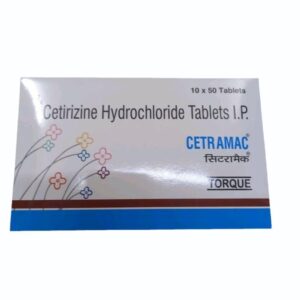CETIRIZINE HYDROCHLORIDE
CETIRIZINE HYDROCHLORIDE: Cetirizine hydrochloride is an antihistamine medication used to treat symptoms associated with allergic conditions such as hay fever, hives, and other allergic dermatoses. It is available over the counter and by prescription.
The primary mechanism of action of cetirizine hydrochloride is its ability to selectively inhibit the peripheral H1 receptors. By blocking these receptors, cetirizine prevents the effects of histamine, a chemical released by the body during an allergic reaction. By reducing histamine activity, cetirizine helps alleviate symptoms like sneezing, itching, watery eyes, and runny nose.
The recommended dose of cetirizine hydrochloride for adults and children 6 years and older is typically 5-10 mg once daily. For children aged 2-6 years, the usual dose is 2.5 mg (half a tablet or one teaspoon of syrup) once daily. The drug can be taken with or without food.
Common side effects of cetirizine hydrochloride may include drowsiness, dry mouth, fatigue, headache, sore throat, nausea, and abdominal pain. However, these side effects are generally mild and temporary. Serious side effects are rare but should be reported to a healthcare provider if experienced. These may include dizziness, fast heartbeat, difficulty urinating, and signs of an allergic reaction such as rash, itching, swelling, or trouble breathing.
It is important to note that cetirizine hydrochloride may cause drowsiness in some individuals, so caution should be exercised when operating machinery or driving a vehicle until the effects of the drug are known. Additionally, individuals with kidney impairment or liver disease may require a lower dosage of cetirizine hydrochloride.
As with any medication, it is advisable to consult with a healthcare professional or read the package insert for specific instructions and precautions before using cetirizine hydrochloride.

